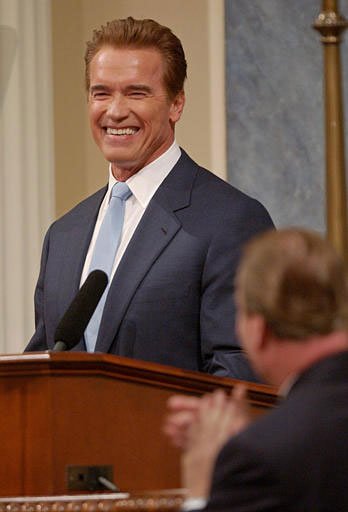GILROY
–
”
Cautiously optimistic
”
may be an overused phrase by the news media, but it accurately
describes local government officials’ reactions to Gov. Arnold
Schwarzenegger’s first State of the State address Tuesday
evening.
GILROY – “Cautiously optimistic” may be an overused phrase by the news media, but it accurately describes local government officials’ reactions to Gov. Arnold Schwarzenegger’s first State of the State address Tuesday evening.
Schwarzenegger’s speech was a charismatic plea for unity in the face of billions in spending cuts he plans to push to combat historic state budget deficits in the current budget year and the next. There will be no new taxes, the governor promised, but he did not preview any of the hard numbers due to arrive when his proposed state budget is released Friday.
Therefore, while local public officials were generally positive about the speech itself, they had little new to say afterward about how the governor’s actions would affect local residents.
“I’d be hard-pressed not to agree with most of the things he said,” Gilroy Mayor Al Pinheiro said of the governor, “but it was a speech. There was nothing in concrete.”
Schwarzenegger gave few details on his spending plan for education, but he did say he had reached a compromise with the education community that would give public school districts more control over how they spend their money.
“I have advocated for that,” Gilroy Unified School District Board President Jaime Rosso said of the latter proposal. “There are something like 100 different sources of funding that are restricted. … It’s real difficult when they restrict your money and then tie your hands on how to spend it.”
While the GUSD wants as much funding as possible, Rosso said, “At the same time we also recognize that the state is in a terrible crisis.” In Rosso’s opinion, the state won’t be able to get out of its budget dilemma without raising taxes.
“I don’t see how they’re going to do it otherwise,” he said. “The cuts are too deep.”
Pinheiro said that if school districts are to get new control over their revenue spending, cities should as well. The state has commandeered property taxes and other city revenue sources, and Gilroy is now left relying mostly on sales taxes – which the state could dip into in the near future, Pinheiro said.
Santa Clara County Supervisor Don Gage said he hopes to see that counties and cities will receive the same amount of revenue in Schwarzenegger’s budget that they were getting before the governor reduced the state’s controversial vehicle license fee, or car tax. The vehicle fee funding had made up about 28 percent of the funds county supervisors have discretion over. The funds go to health care, police and fire protection. Santa Clara County and other municipalities recently threatened to sue if the funding wasn’t restored.
“I have to wait and see what he’s going to do,” Gage said, despite having just heard Schwarzenegger promise, in his speech, to pay municipalities at the old vehicle fee levels.
“It would be irresponsible for the state to take the (vehicle fee) money from counties and cities,” Schwarzenegger said Tuesday. “They did not raise the car tax, and they should not bear the burden of its rollback.”
Santa Clara County has already cut $281 million from its discretionary fund in the past three years, and further cuts will likely hit the county’s mental health services hardest – meaning more mentally ill people on city streets and in jails, Gage said.
“Whatever (Schwarzenegger) does, it’s going to hurt,” Gage said. “I’m not blaming him because he didn’t make the problem. …. He’s the one who has to deal with it. … Whether or not the Assembly and Senate are willing to deal with him is going to tell the story.”
Gilroy’s state Assemblyman, Simon Salinas, gave an upbeat response to Schwarzenegger’s speech. Speaking from Sacramento shortly after the address, Salinas said he agreed with Schwarzenegger’s stated commitment to “rein(ing) in spending.”
Nevertheless, the Salinas-based Democrat said, “We’re going to have to wait and look at the budget details. … One of the areas (Schwarzenegger) didn’t mention was health care.”
In the news from Sacramento so far, health care and welfare are expected to receive the heaviest of the governor’s proposed cuts. Salinas said he is most concerned about the effect of slashed health care on elderly people and children. Nevertheless, he said he thinks the Democrats who control the Legislature are willing to work with Schwarzenegger.
“Overall, I think he set up an effort of trying to act in a bipartisan manner,” Salinas said. “While negotiations can be very tough, we can work together.”
Salinas was encouraged by Schwarzenegger’s pronouncement that “economic growth and the environment can coexist” and his endorsement of solar power for homes and hydrogen power for automobiles. The Assemblyman also thought highly of giving school districts more spending control, and he believed Schwarzenegger and legislators could find “common ground” on protecting school funding.
“Frankly, that’s part of economic recovery,” Salinas said. “You’ve got to have a strong educational programs to (attract business), and I think the governor understands that.”
On the speech itself, Salinas said, “He’s certainly going to be a good salesman (for California). He’s a movie actor, so he’s going to be very polished and a good communicator.”
State Sen. Bruce McPherson, a Santa Cruz Republican who represents the Gilroy area, strongly supported the governor’s message. Interviewed by an NBC news reporter right after the speech, McPherson gave high marks for Schwarzenegger’s educational priorities and described his idea for a “green bank” fund to help retrofit energy-inefficient businesses as “right on target.” The senator’s strongest affirmation, however, went for Schwarzenegger’s stance on bringing California’s worker’s compensation insurance policy in line with that of most states.
“To get a better business climate, we need to fix this horrible worker’s compensation (situation),” McPherson said. “We pay twice the rates as the rest of the nation, and we get half the benefits.”














